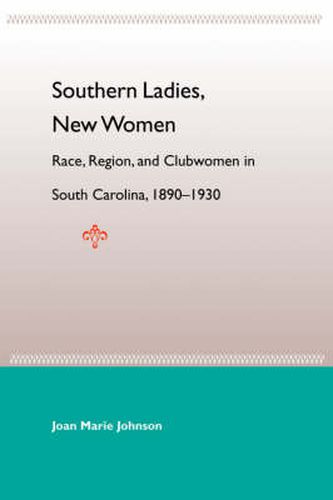Readings Newsletter
Become a Readings Member to make your shopping experience even easier.
Sign in or sign up for free!
You’re not far away from qualifying for FREE standard shipping within Australia
You’ve qualified for FREE standard shipping within Australia
The cart is loading…






This title is printed to order. This book may have been self-published. If so, we cannot guarantee the quality of the content. In the main most books will have gone through the editing process however some may not. We therefore suggest that you be aware of this before ordering this book. If in doubt check either the author or publisher’s details as we are unable to accept any returns unless they are faulty. Please contact us if you have any questions.
Joan Marie Johnson investigates how the desire to create a distinctive southern identity influenced black and white clubwomen at the turn of the 20th century and motivated their participation in efforts at social reform. Often doing similar work for different reasons, both groups emphasized history, memory, and education.Focusing particularly on South Carolina clubs, Southern Ladies, New Women shows that white women promoted a culture of segregation in which southern equaled white and black equaled inferior. Like the United Daughters of the Confederacy, they celebrated the Lost Cause and its racial ideology. African-American clubwomen fought for the needs of their communities, struggled against Jim Crow, and demanded recognition of their citizenship. For both groups, control over historical memory thus became a powerful tool, one with the potential to oppress African-Americans as well as to help free them.This ambitious book illuminates the essence of what South Carolina’s clubwomen of both races were thinking, feeling, and attempting to accomplish. It considers the entwined strands of race and gender that hampered their attempts to bridge their differences and that brought tension to their relations with northern clubwomen. It also addresses the seeming paradox of the white clubwomen who belonged simultaneously to tradition-minded organizations, such as the Daughters of the American Revolution or the Colonial Dames, and to a variety of forward-looking associations that engaged in impressive social reform.Although Johnson looks most closely at the Progressive Era in South Carolina, her comparative study of race, gender, reform, and southern identity reveals that women’s clubs, both white and black, contributed to the creation of the new cultural climate and social order that emerged throughout the post-Civil-War South. This book will be important for all who are interested in a better understanding of race relations in contemporary America.
$9.00 standard shipping within Australia
FREE standard shipping within Australia for orders over $100.00
Express & International shipping calculated at checkout
This title is printed to order. This book may have been self-published. If so, we cannot guarantee the quality of the content. In the main most books will have gone through the editing process however some may not. We therefore suggest that you be aware of this before ordering this book. If in doubt check either the author or publisher’s details as we are unable to accept any returns unless they are faulty. Please contact us if you have any questions.
Joan Marie Johnson investigates how the desire to create a distinctive southern identity influenced black and white clubwomen at the turn of the 20th century and motivated their participation in efforts at social reform. Often doing similar work for different reasons, both groups emphasized history, memory, and education.Focusing particularly on South Carolina clubs, Southern Ladies, New Women shows that white women promoted a culture of segregation in which southern equaled white and black equaled inferior. Like the United Daughters of the Confederacy, they celebrated the Lost Cause and its racial ideology. African-American clubwomen fought for the needs of their communities, struggled against Jim Crow, and demanded recognition of their citizenship. For both groups, control over historical memory thus became a powerful tool, one with the potential to oppress African-Americans as well as to help free them.This ambitious book illuminates the essence of what South Carolina’s clubwomen of both races were thinking, feeling, and attempting to accomplish. It considers the entwined strands of race and gender that hampered their attempts to bridge their differences and that brought tension to their relations with northern clubwomen. It also addresses the seeming paradox of the white clubwomen who belonged simultaneously to tradition-minded organizations, such as the Daughters of the American Revolution or the Colonial Dames, and to a variety of forward-looking associations that engaged in impressive social reform.Although Johnson looks most closely at the Progressive Era in South Carolina, her comparative study of race, gender, reform, and southern identity reveals that women’s clubs, both white and black, contributed to the creation of the new cultural climate and social order that emerged throughout the post-Civil-War South. This book will be important for all who are interested in a better understanding of race relations in contemporary America.